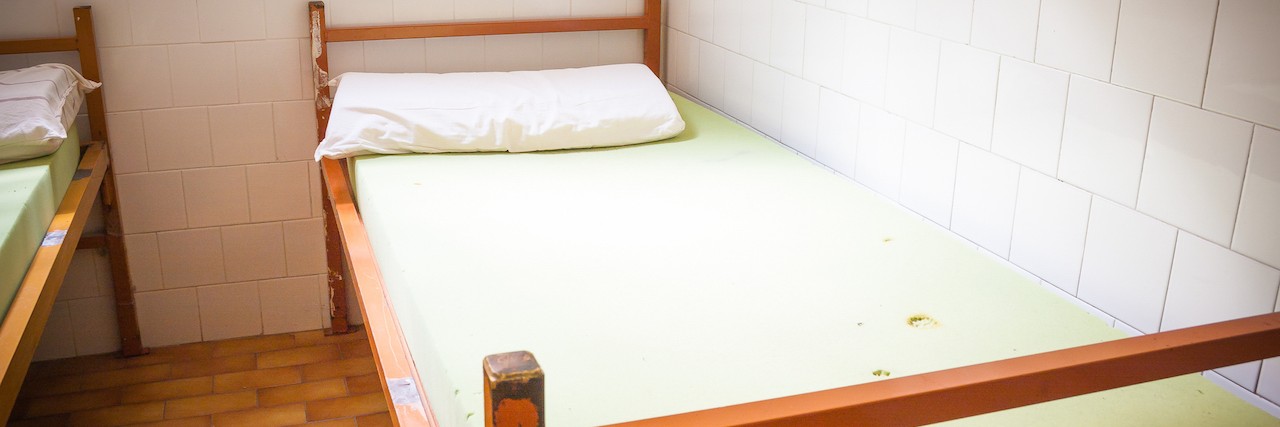I remember telling my friends for months over and over again I did not want to go to the psychiatric hospital. I was terrified and I did not want to be labeled as “crazy.” Every time someone asked if they should call the police, I said “no.” Who would?
After attempting suicide, I found myself in the emergency room being evaluated by a psychiatrist, and he told me I had two choices: voluntarily or involuntarily check-in, where I would be forced to check-in to inpatient. I decided to go so I could have more control over the process. I was dehydrated and to say the least, mentally, I was not on planet Earth — everything seemed like a blur. I was asked to remove my clothing and valuables and change into scrubs, and to place everything into a plastic bag. It was around 1 p.m., and after almost nine hours (seemed like forever), I got into a wheelchair and a nurse pushed me into the elevator and brought me to the fourth floor (top level of the of the hospital).
As I went through the double doors, the doors locked from inside and outside, and I saw patients in a common area watching TV. I was brought to a room with one of the medical assistants and he took my vitals. And as I started to process what was happening to me, I cried like a baby. I thought to myself, “What did I sign up for?” I was escorted to my room, asked the nurse to leave the light on and the door open and then cried myself to sleep. The next morning when I got up, I noticed the blue walls, a door that led to a toilet, a sink, a locked window with no view and my roommate sleeping. I did not eat or leave my room because I was scared. I’ve never been so scared in my life. All I could think about was the psychiatric units in the movies. I thought someone was going to attack me. There were check-ins every 15 minutes by the staff, you are assigned a social worker, nurse and psychiatrist. You get three meals and a snack. You have to ask to take a shower and to wash your clothes. I said to myself, “I must be dreaming or I am in jail.”
My social worker suggested I go into the day room and participate in therapy. At this point, I was willing to try anything because I wanted to go home. And to my surprise, it was nothing like the movies. I walked into a therapy session of emotional bingo. As I listened to the patients talk, I shared their hurt and pain — stories of abuse, grief and untreated childhood traumas. I decided to go to another session later in the day — music therapy. We listened to music and did arts and crafts, and even though I felt out of place in the unit, it was so relaxing.
I met entrepreneurs, overworked-mothers, people with college degrees and a former police officer; people like me and you. The movies do not show you the psychiatric unit can be a calm and peaceful place. Where I was, it allowed people with mental illness to become stable and begin to work on his/her issues through medication, therapy, writing, reading and resting. The staff was kind, and really wanted to see me succeed. During my stay, I made amazing connections and started new friendships. It is a great feeling when you meet someone who identifies with you, and does not judge you. My old medication stopped working so I was given new medication, and within a few hours my suicidal thoughts stopped. I took an active roll in creating my treatment plan in order to have an effective recovery process.
After I was discharged, I was placed in a partial hospitalization; I stayed at the hospital for six hours, five days a week, but I was able to go home. I thought I did not belong. I have a master’s degree, I started my own company and two organizations, I have people who look up to me and love me, I have my own apartment, I drive my own car. Mental illness has nothing to do with your educational, professional or socio-economic background; sometimes it is genetic or simply life, or maybe a combination of the two.
Please understand anyone can have a mental breakdown — anyone can have a mental illness. Let’s have an honest discussion and help end the stigma about mental illness.
The Mighty is asking the following: What is a part of your or a loved one’s disease, disability or mental illness that no one is aware of? Why is it time to start talking about it? Check out our Submit a Story page for more about our submission guidelines.

